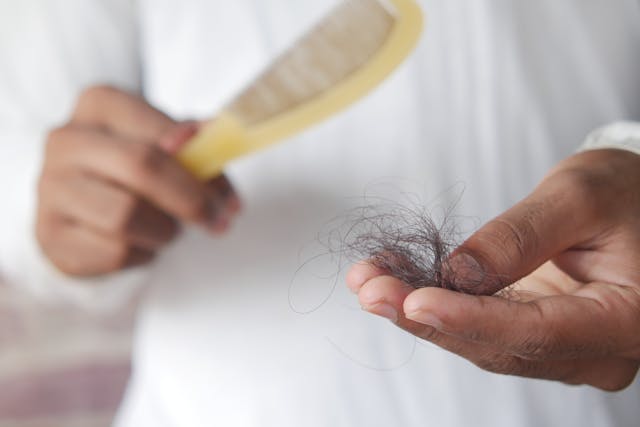Thinning Hair Solutions: Your Starting Guide

Thinner hair often creeps up on you unexpectedly. One moment your hair seems voluminous and robust, and the next, you notice more strands in the shower drain. For some, the cause is genetic, while others may experience it due to lifestyle choices, stress, or external factors. Watching your hairline recede or seeing your part grow wider can feel discouraging. However, thinning hair doesn’t have to dictate your appearance or self-esteem. Let’s explore the reasons for thinning hair and initiate steps towards achieving fuller, healthier locks.
It’s Not All in Your Mind—But Partly It Is
First, let’s dive into the causes. Genetics can significantly contribute to hair thinning, especially with conditions like androgenetic alopecia or hereditary hair loss. However, they are not the sole factor. Both physical and mental stress can disrupt your hair’s natural growth cycle, leading to increased shedding. Hormonal changes play a big role too. Events like pregnancy, menopause, or changing birth control methods can alter your hair’s normal cycle.
Additionally, we can’t ignore the impact of diet. If your meals lack essential nutrients, your hair may suffer, lacking vital elements like iron, biotin, and zinc. Insufficient nutrients can result in weak, fragile hair that easily breaks. Coupled with excessive styling, heat treatments, and harsh chemicals, these factors can exacerbate hair thinning.
Everyday Practices that Harm Your Hair
The hard truth is many of us treat our hair as if it were resilient. Everyday habits like frequent heat styling, tight hairstyles, and neglecting scalp care can cause significant damage. Even the way you wash and dry your hair matters. Hot water, aggressive towel drying, and unsuitable hair products open the door to breakage.
Your scalp is another critical area that often gets ignored. Neglecting it or burdening it with too many products can choke the hair follicles and hinder healthy hair growth. And chronic stress? It’s a disaster for both your mind and your hair. High cortisol levels can disrupt the hair growth cycle, resulting in more hair entering the shedding phase. If your hair feels thinner after a stressful spell, excess stress is likely the culprit.
Addressing the Root of the Problem
To combat thinning hair, begin by focusing on the healthcare of your scalp. Selecting a shampoo formulated for thinning hair is crucial to start at the roots. The right shampoo not only cleanses but also nourishes the scalp, fortifies hair follicles, and fosters an environment for robust growth. Seek shampoos containing ingredients like keratin, biotin, or niacin that target thinning, and steer clear of products that strip away natural oils, to avoid a dry, irritated scalp.
Consistency is essential. Switching to a shampoo suited for thinning hair will not yield immediate results, but with time, you’ll notice improvements in the feel of your scalp and the look of your hair. Don’t bypass the scalp massage either. Taking a few extra minutes to work the shampoo into your scalp increases blood flow to the follicles, offering them additional care.
Why Scalp Care Deserves More Attention
Think of your scalp as the groundwork for your hair’s wellbeing. Without a healthy scalp, your hair’s potential is compromised. An oily, flaky, or irritated scalp can hinder hair growth and exacerbate thinning. Scalp care is crucial for maintaining healthy hair.
Exfoliating your scalp is more beneficial than it seems. Over time, dead skin, product residue, and oils can block hair follicles, decelerating growth and leading to fine strands. A quality scalp treatment or scrub can clear the path for thriving hair. Don’t overlook hydration either. Just as your skin needs moisturizer, a well-nourished and hydrated scalp is beneficial. Argan or jojoba oils can be particularly effective when used in moderation.
Nourishing Your Hair from Within
Protein forms the foundation of your hair, so a lack of it in your diet can negatively impact your strands. But protein isn’t the only necessity. Iron helps oxygenate hair follicles, biotin reinforces keratin, omega-3 fatty acids maintain scalp moisture, and zinc aids in repair and growth.
Not keen on supplements? That’s alright. You can obtain hair-friendly nutrients from whole foods. Options like eggs, salmon, spinach, nuts, and seeds are excellent. If you follow a vegan or vegetarian diet, don’t worry—there are plenty of plant-based options for nourishing your hair. Ensure your diet is balanced, as what benefits your body typically benefits your hair too.
Less Stress, More Growth
Though it may seem overly simplistic, managing stress levels can directly influence your hair health. Ongoing stress can shift hair follicles into a resting phase, halting growth and eventually leading to hair loss. If stress appears to be a factor in your hair loss, it’s time to focus on self-care.
Activities like meditation, physical exercise, or scheduling regular breaks can help reduce cortisol levels and enhance overall well-being. While alleviating stress alone won’t regenerate lost hair, it can prevent further thinning and foster a more conducive environment for growth. Consider it as giving your hair an opportunity for recovery.
Revitalize Your Hair
Thinning hair need not signify the end of appealing hair days. By understanding and addressing the primary causes, modifying habits, and emphasizing scalp and hair health, you can strive towards stronger, denser hair. It’s a process of persistence and care, and though it requires time to see changes, the investment is worthwhile.
Bear in mind, your hair constitutes only a part of your identity, not its entirety. Care for it, but don’t let it define you. Confidence is beyond mere appearance—it originates from how you feel within.




